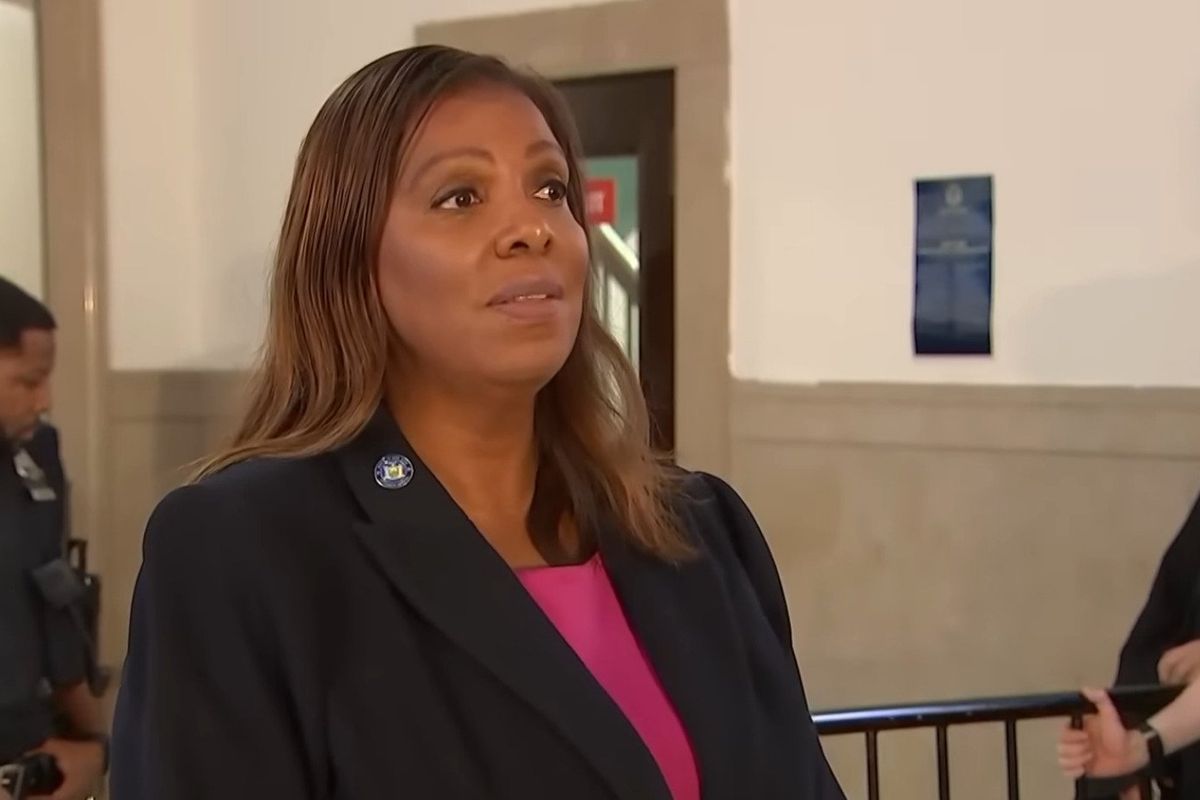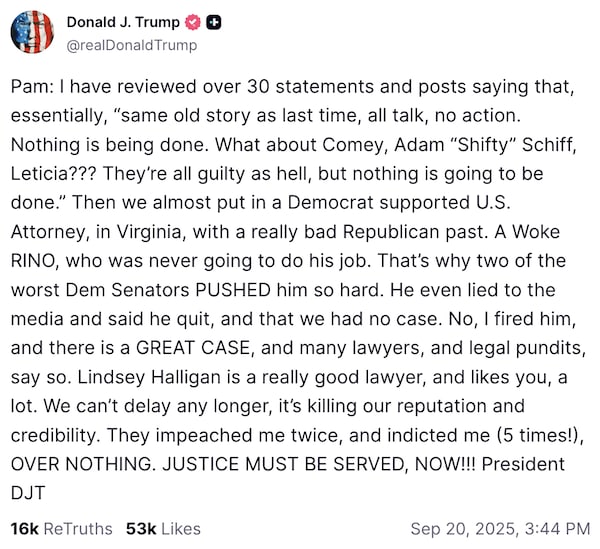Irredeemable Justice: Letitia James' Indictment Tolls The Depth Of Corruption

Letitia James
With the indictment of former FBI Director Jim Comey—on spurious charges, against the judgment of career prosecutors, and solely to satisfy the President’s personal vendetta—the Department of Justice crossed over to a new low.
But now, with the indictment of New York Attorney General Letitia James—and more reprisal indictments on the immediate horizon—it’s become clear that the corrupt abuse of the law to go after Trump’s adversaries is a principal mission of this Department of Justice. Far from a one-off, it’s the Department’s new business model.
I’ve explained before why bringing cases at the President’s insistence—not as acts of justice, but as political reprisals against his enemies—is as abhorrent a violation of the Constitution and DOJ norms as we’ve ever seen. It offends both the First Amendment and the Due Process Clause, flouts the Principles of Federal Prosecution that have served as the bible for federal prosecutors for generations, and betrays the most basic notions of impartial justice in any democracy.
Any prosecutor knows this to her marrow. It is the literal antithesis of the DOJ’s watchword of justice without fear or favor. That principle used to separate us from the corrupt justice systems that serve the personal whims of tyrants like Vladimir Putin and Recep Tayyip Erdoğan.
Our history has seen a few instances of presidents targeting citizens out of personal animus—Richard Nixon’s bitter obsession with Daniel Ellsberg comes to mind, which in fact became the genesis of Watergate. But none of them remotely approaches the open and shameless campaign Donald Trump has launched: a series of directives to his Justice Department, backed with the threat of discharge, to indict his enemies for no reason other than that they are his enemies.
Exhibit A (and it will literally be that in upcoming motions in both the Comey and James cases) is Trump’s own “private” message to Attorney General Pam Bondi, which he accidentally made public. It built to a frothing conclusion:
“We can’t delay any longer—it’s killing our reputation and credibility. They impeached me twice and indicted me (5 times!) OVER NOTHING. JUSTICE MUST BE SERVED, NOW!!!”
“Justice,” in Trump’s hands, plainly means punishment—punishment through the corrupt use of the criminal system—because these perceived antagonists brought righteous cases against him. In other words, they did their jobs and followed their oaths.
A recent survey by Emily Bazelon and Rick Hasen of fifty top D.C. lawyers—many former senior DOJ officials and evenly divided between Republicans and Democrats—found complete unanimity: every single respondent believes that Trump and Bondi have used the Department of Justice to target political enemies and reward allies.
Every single one.
As one respondent put it, “[w]hat’s happening is anathematic to everything we’ve ever stood for in the Department of Justice.”
Every single one. It’s beyond stunning—and for alumni of the Department, beyond heartbreaking.
There isn’t another side to the argument. Every actor in the system—from defense attorneys to Justices on the Supreme Court—recognizes what is happening. The only question is how the criminal justice system should respond.
The specifics of the James case are almost comically small-bore. James is charged with falsifying mortgage or rental information on a handful of forms—or at least, that appears to be the charge. As with the Comey indictment, the actual document is so elliptical as to be baffling. Both are sketchy and amateurish by DOJ standards, particularly for cases against such prominent defendants.
The apparent core allegation is that James bought a home for her great-niece to live in with a mortgage loan requiring her to use the $139,000 three-bedroom house as a secondary residence, not a rental property, but that she later treated it as an investment.
Even taken at face value, the claims are thin, and intent in particular will be hard to prove. The great-niece reportedly testified to a Norfolk grand jury that she has lived in the house rent-free the entire time. Yet the grand jury that U.S. Attorney Lindsay Halligan hastily convened last week never heard from her.
More generally, because of contradictory statements on different forms and labyrinthine lending regulations, the government will have a hard time proving intent—that James knowingly engaged in a “scheme to defraud” by misrepresenting the property’s use.
Courts have interpreted the intent requirement stringently, as requiring that the defendant knowingly engaged in a fraudulent scheme and specifically intended to deceive or cheat a financial institution in order to obtain money or property. With the cross-cutting evidence and confusing body of regulations, that’s a real hurdle.
But considering the difficulties of proof is really beside the point. The deeper issue isn’t evidentiary at all—it’s constitutional.
Even if we assume, for argument’s sake, that somewhere in the sheaf of mortgage documents there is a single false statement, and that the government could somehow prove it beyond a reasonable doubt, the critical legal point remains: it doesn’t matter.
That’s because a selective prosecution is a constitutional violation that requires dismissal, without regard to whether the government can prove a crime.
Under the Supreme Court’s two-part test, selective prosecution requires showing (1) that the defendant was singled out from among similarly situated individuals, and (2) that the decision was driven by an impermissible factor such as politics or personal reprisal.
Notice that the test does not depend on the strength of the case. The constitutional injury—the violation of due process and First Amendment rights—is the same either way.
By that measure, James’s claim is, if anything, even stronger than Comey’s.
On the first prong, prosecutions for perjury of Comey’s alleged sort are vanishingly rare, leaving the standards amorphous. The administration can at least argue that Comey’s prominence warranted heightened scrutiny.
Not so with James. U.S. Attorney’s Offices have limited resources and prosecute only a fraction of chargeable cases. Each office maintains guidelines setting a minimum threshold of loss or harm before a case merits prosecution. Even accepting the government’s theory in full, James’s case would involve a loss of just $18,000—the difference between the mortgage rate she obtained and what she supposedly should have paid. That is pocket change in federal terms, far below DOJ’s own charging thresholds. Such irregularities, if pursued at all, are resolved administratively, not criminally.
That makes the first prong of James’s claim mathematically airtight: others who allegedly commit comparable “frauds” are not charged.
And that leads directly to the second prong—motive. There has to have been some reason beyond the merits that James was charged.
The Comey indictment provides that reason. It shows that political reprisal has become the DOJ’s new organizing principle. Every fact demonstrating the impropriety of the Comey case applies with equal force here. In James’s case, the animus is even clearer: years of vitriolic attacks from Trump and his allies calling for her prosecution—rhetoric that began nearly a decade ago.
Every selective prosecution, apart from working a horrific injustice on the defendant, corrodes public faith in equal justice and leaves an indelible stain on the Department of Justice. When citizens see the criminal code wielded as a political cudgel, they lose faith not only in a single case but in the justice system itself. That cynicism may prove the most lasting damage of all.
Letitia James will very likely beat these charges—the case is weak, sloppy, and above all brazenly political. But the rank, corrupt misuse of the federal prosecutorial power exacts a cost even if the courts do the right thing.
The integrity of the Department of Justice is a core aspect of the rule of law. It now has been shattered, and the collateral damage to the rule of law itself is inevitable.
Not that Trump cares a farthing about any of that. He will keep skating from one wrecked case to another, claiming vindication or shifting blame as each collapses. He’s already extracted a pound of flesh—the anxiety, the reputational hit, the legal bills. For his enemies, that’s punishment enough.
Bondi and Halligan, though, may not skate so easily. They hold law licenses that obligate them to uphold ethical rules they’ve shredded beyond recognition. When the dust settles, their reckoning may be the only justice left standing.
The Framers’ Warning
The Founders foresaw this danger. Madison warned in Federalist 51 that the greatest threat to liberty would come not from foreign invasion but from “the accumulation of all powers, legislative, executive, and judiciary, in the same hands.” The Constitution’s structure—its separation of powers and independent judiciary—was meant precisely to forestall what Trump is now attempting: the conversion of the machinery of justice into a personal weapon of vengeance.
Hamilton, in Federalist 65, defined “the abuse or violation of some public trust” as the essence of political corruption. What greater abuse could there be than a President turning the criminal law into a means of retribution, and prosecutors into instruments of fear?
That is the terrain where the country now lives.
It’s also the territory leading in a straight line from constitutional rule to tyranny. The instances of democratic backsliding in the last 100 years predominantly begin not with tanks in the streets, but with the exploitation of legal mechanisms, transformed corruptly into instruments of power and vengeance for the personal benefit of a strongman tyrant.
The Department of Justice, once lionized as a bulwark against tyranny, has now been recast as tyranny’s first instrument. As all-in as Bondi, Halligan, and the rest have gone on Trump’s reprisal agenda, the Department is now beyond redemption. It falls to the rest of us—lawyers, judges, and citizens alike—to fight to restore the boundaries that the administration has annihilated.
Harry Litman is a former United States Attorney and the executive producer and host of the Talking Feds podcast. He has taught law at UCLA, Berkeley, and Georgetown and served as a deputy assistant attorney general in the Clinton Administration. Please consider subscribing to Talking Feds on Substack.
Reprinted with permission from Talking Feds.
- We Are All Lisa Cook: Trump's Weaponized Government Endangers Everyone ›
- 'Galling Cowardice': ABC Cancels Kimmel Under Trump White House Pressure ›
- Ivanka Trump Tried To Dodge Her Court-Appointed Financial Monitor ›
- The 'Weaponization Of Justice' Began During Trump's First Term - National Memo ›
- Comey Prosecution Appears Doomed After Federal Judge Eviscerates Halligan's Conduct - National Memo ›
- In The Fed Case, Justices Confront The Problem Of The Lying President - National Memo ›









